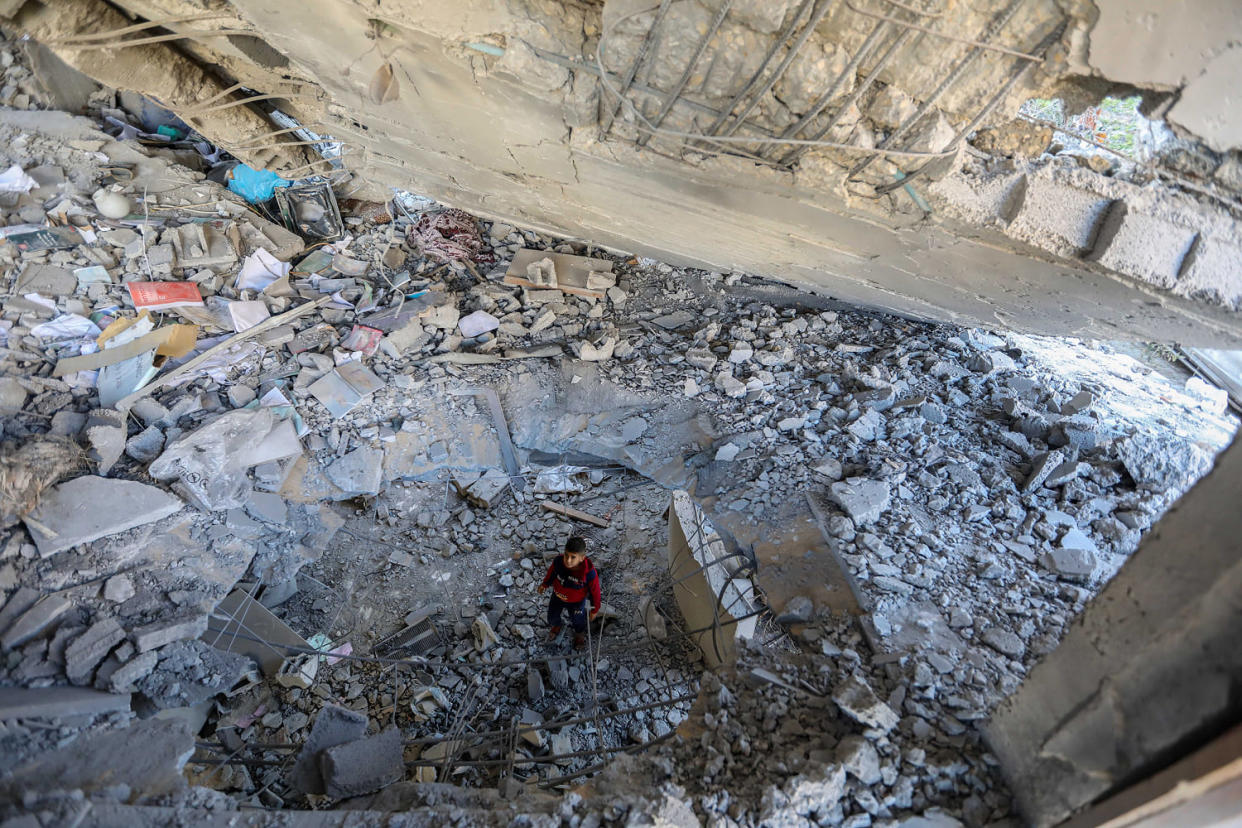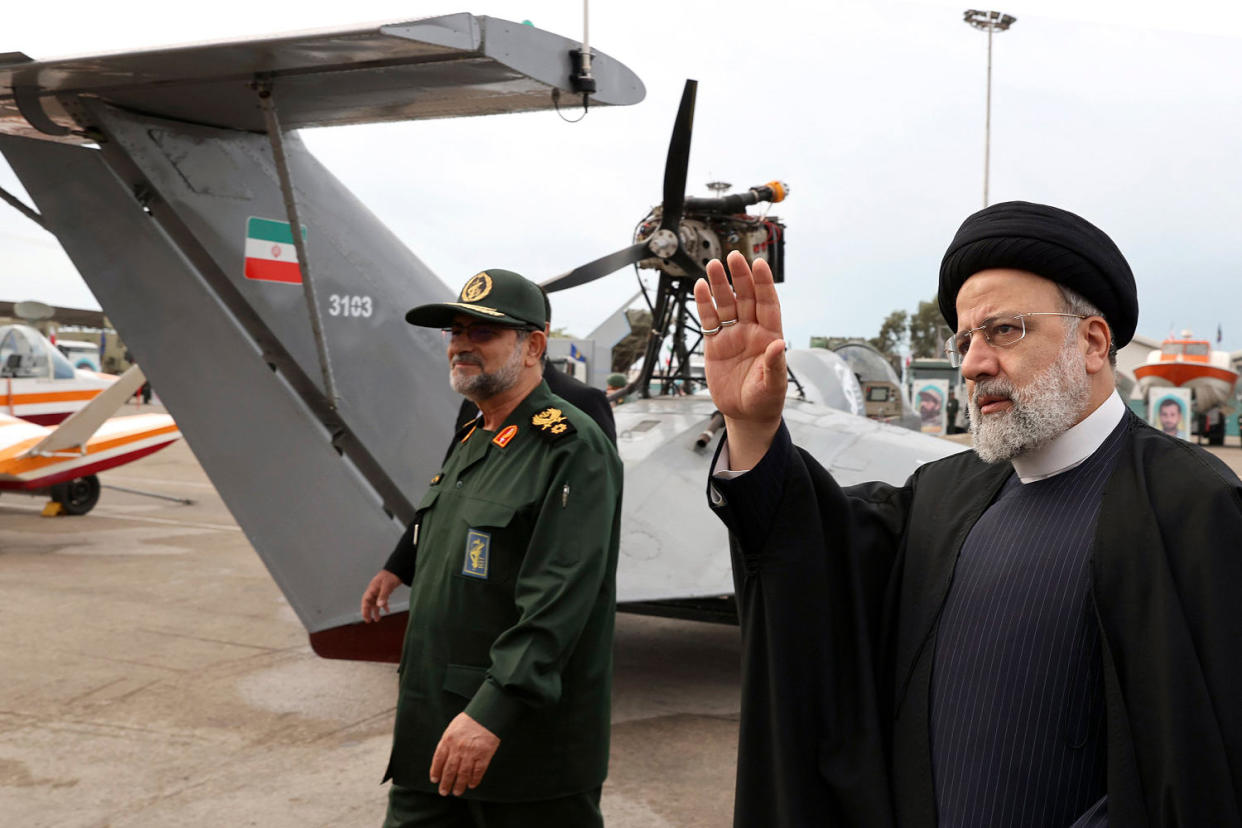Biden sends Iran a signal of deterrence — and restraint — with first retaliatory strikes
ERBIL, Iraq — The dozens of airstrikes launched by the United States late Friday are by far its biggest attacks against Iran-backed militants in the Middle East during this current round of conflict.
However the strikes in Iraq and Syria, an initial retaliation for the killing of three American soldiers, did not go as far as some more hawkish figures had hoped, as the White House tries to avoid an all-out war with Iran. Some regional watchers have warned that this apparent restraint — including telegraphing the attacks well in advance — may mean the militias feel emboldened to continue their violence against American forces in the region.
The bombings drew an angry reaction from Iraq itself, which summoned the U.S. envoy in protest and said the strikes on its soil had killed civilians and risked destabilizing the region. Syria said the U.S. was fueling regional conflict in “a very dangerous way.” Iranian officials have been similarly hostile, and Tehran, though also reluctant to see a wider war, has warned American strikes would not go unanswered.
“What you saw last night and what you are going to see again was not insignificant,” a senior Biden administration official told NBC News. “When you hit 85 targets over 30 minutes, that sends a strong signal about the capability that we have,” the official said, adding that “there are other things we’re going to do. Some you will see and some you won’t see.”
‘Somewhere in the middle’
The past 24 hours, in which U.S. fighter jets also hit Houthi rebel drones in Yemen and Israel was suspected of killing an Iranian military adviser in Syria, will do little to tamp down rising tensions across the Middle East. The European Union’s top diplomat, Josep Borrell, described the situation Saturday as “a boiler that can explode.”
“This is by far the most expansive military action we’ve taken against Iran’s proxies in Syria and Iraq to date — that makes this a significant development by itself,” said Charles Lister, a senior fellow at the Middle East Institute, Washington’s oldest think tank focusing on the region.
“In terms of measuring this by how maximalist or minimalist we could have been, this sits somewhere in the middle, not a major campaign by any means, but a notable one that if followed by more could begin to send a deterrent message,” Lister told NBC News.
“But for now, I’d count on the militias feeling relatively confident that they’ll be targeting Americans again not too long from now,” he said.
The U.S. strikes are the latest salvo in the simmering, Middle East-wide unrest that has threatened to boil over since Hamas’ Oct. 7 attack on Israel, in which some 1,200 people were killed, and Israel’s subsequent war in Gaza, which has so far killed more than 27,000 people.

A network of militant groups backed by Iran — the self-styled “Axis of Resistance” — has been launching attacks against Israel, the U.S. and international shipping, which the militants say is a protest against Israel’s war and in support of the Palestinians. As part of this so-called axis, powerful Iran-backed militants have stepped up attacks against American forces across the Middle East, stationed there following the Syrian civil war and the military campaign against ISIS.
There have been more than 160 attacks by these groups across Syria and Iraq, wounding American soldiers, including some who have suffered brain injuries. Then last week, a drone attack on a U.S. base in Jordan killed three American service members — prompting President Joe Biden to vow a forceful, multistage response, while simultaneously trying to avoid direct war with Iran.
This came Friday night in the form of some 85 strikes against targets in Iraq and Syria linked either to Iranian militias or Iran’s powerful Islamic Revolutionary Guard Corps, the IRGC, which is in Syria supporting President Bashar Assad.
The heavily trailed U.S. operation gave ample time for Iranian military commanders and their allies to hunker down. A senior Iraqi official told NBC News on Wednesday that they had vacated sensitive sites and moved weapons.
“We are not trying to send a signal to anyone other than those who mean Americans harm,” Lt. Gen. Douglas A. Sims II, director of operations of the Joint Staff, told journalists Friday.
Nonetheless some analysts did not see the strikes as a significant step up in any U.S. effort at deterrence.
They appeared to be “different in terms of power, number of targets, and use of not only airstrikes but also cyberoperations. There could also be covert action elements that we don’t know about,” said Jason Brodsky, the policy director of the Washington-based group United Against Nuclear Iran. But, he added in a post on X, “nothing that’s public suggests to me anything of significant strategic value that was hit. While the quantity of targets may have increased, the quality has more or less stayed the same.”
Experts say the advance warning may partly have been to give Iran and its proxies a bloody nose without triggering an escalatory response, especially in Iraq, where the U.S. has important bases and is trying to maintain ties to a Shiite-led government that is also close to Iran.
Regardless, Iraq’s response was scathing, setting up a verbal conflict between Washington and Baghdad, a government that still hosts U.S. troops following the 2003 invasion and subsequent fight against ISIS.

The U.S. said it had warned Iraq in advance of the airstrikes, something Iraq denied while accusing Washington of killing 16 people in the country, including civilians, and having “deliberately deceived and falsified the facts.”
The senior U.S. administration official told NBC News this was not true. “It wasn’t a huge heads up,” the official said, which they said was to be expected given Iraq’s relationship with Iranian-backed militias in the country. “But it is not accurate to say they weren’t informed. Iraq is a sovereign nation and we respect their right to express their concerns, but then they shouldn’t harbor these Iranian groups on Iraqi soil.”
In Syria, the Syrian Observatory for Human Rights, a Britain-based watchdog, said 23 people had been killed.
The current relationship between Iraq and Iran is a complex one, with Iraq politically dependent on the powerful, Iran-backed militias based there, but at the same time hosting the American troops.
One of the most powerful of these militias, Kataib Hezbollah, has its “footprints” on the deadly attack against U.S. forces in Jordan, the Pentagon said. Kataib Hezbollah said last week it would pause attacks against Americans in the region because it did not want to cause embarrassment for the Iraqi government, which had called on all sides for calm.
But on Saturday, the militants hinted that this may yet change, posting a video to the Telegram messaging service quoting its military spokesman Jaafar al-Husseini, interviewed last month.
“The Americans will see days they will never forget throughout history,” he said.
Keir Simmons and Mo Abbas reported from Erbil, and Alex Smith from London.
